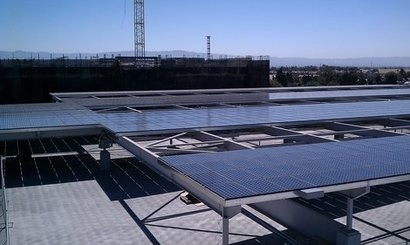
Currently those who have to go through the planning system are having to wait over eight weeks and face extra costs.
The move will encourage more people to install solar panels on their properties, slashing their energy bills in the process and cutting down on harmful emissions.
“We must make sure our homes are fit for the future and can help us meet our net zero ambitions” said Housing and Planning Minister Lee Rowley MP. “By cutting red-tape in the planning system we can make sure homeowners and businesses can install solar panels without being held up by costly delays. Crucially, these permitted development rights are still subject to important conditions, including their use in conservation areas.”
The changes will mean homes with flat roofs will be able to install panels without planning permission, bringing rules in line with those for businesses.
Current rules that require businesses to apply for planning permission if solar panels will generate more than one megawatt of electricity will also be scrapped, meaning organisations will be able to install more solar panels on rooftops without the delay and cost of applying for planning permission.
The government has also reiterated that, where possible, already developed land should be used for solar panels, which is why the changes will make it easier for panels to be installed in canopies above car parks, if they are over ten metres away from people’s homes.
“Removing the 1MW restriction for industrial rooftop solar will help us meet our target of 70 GW of solar power by 2035 while supporting hundreds of long-term skilled British jobs, bolstering our world-leading renewables sector and reducing bills for consumers with panels” added Energy Security and Net Zero Minister Graham Stuart MP.
The government’s decision has been welcomed by solar trade association Solar Energy UK, which has been lobbying for such a move.
As things stand, solar panels may be installed without planning permission in most circumstances. However, exceptions apply in the case of homes with flat roofs and for installations with a capacity of more than one megawatt – typically on large commercial buildings such as warehouses and factories. These lead to extra costs and delays, impeding the attainment of climate and energy security goals, while slowing economic growth and the reduction of energy bills. The legislation introduced to the Commons would strike out this red tape.
“The potential of installing solar power on large commercial rooftops is vast, its prospective capacity having been estimated at 15 gigawatts across the country” said Solar Energy UK Chief Executive Chris Hewett. “So eliminating one of the stumbling blocks on the way to fulfilling that opportunity is extremely welcome, helping to make British businesses more competitive by slashing energy bills, bolstering the economy and pushing us further towards net zero.”
For additional information:

